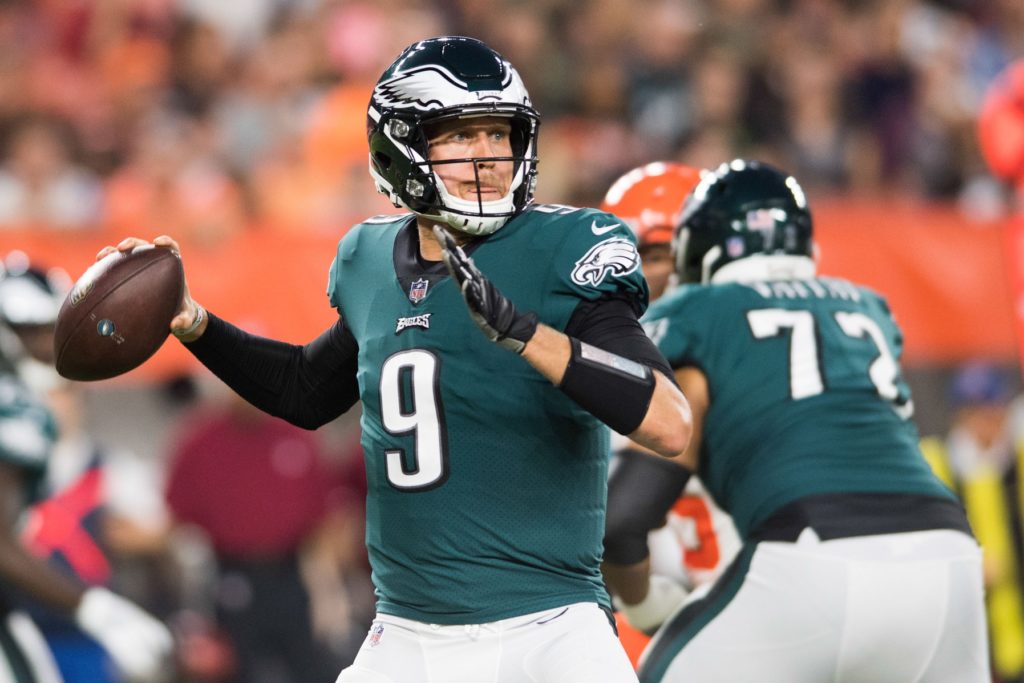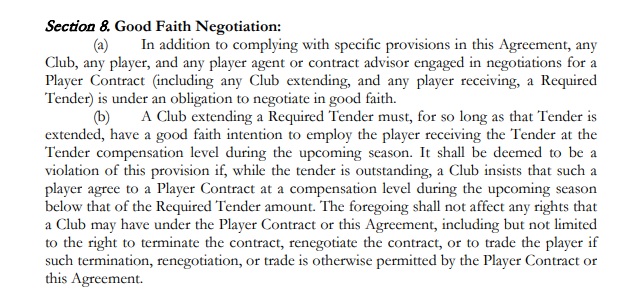Ad Disclosure
Nick Foles and the Franchise Tag: Things to Know

What’s up with Nick Foles?
The last thing we heard about the Super Bowl MVP is that the Eagles picked up his 2019 option, which Foles then voided by paying back $2 million dollars to become a free agent.
That means one of two things. One, Foles walks and the Eagles free up his salary while receiving a 2020 compensatory draft pick. Two, they can franchise tag the quarterback to retain his rights, and then try to trade him instead.
I hear some people saying “it doesn’t matter if he’s tagged or if he walks because they’re getting the draft pick anyway!” Yes, that’s true, and people bitch about it in the comments section and on the Crossing Broad Facebook page, but the compensatory pick for Foles, which should be a 3rd rounder, would not be usable until next year. If you tag and trade Nick (to Jacksonville, for instance), you could get a 2019 draft pick, or some combination of picks for this year and next year. I wrote last week about Nick’s value RE: the Joe Flacco trade, that if Flacco is worth a 4th round pick at age 34, then Foles is going to be valued at a 3rd rounder.
Right, so the franchise tag. There are three different types of tags – exclusive, non-exclusive, and transition.
Here’s how each of those works, after the jump:
Exclusive: No negotiating with other teams because the tagging team plans to keep you on the roster.
Non-exclusive: You can sign another team’s offer sheet, which allows your current team to match. If no match, they get a pair of compensatory first round draft picks.
Transition: You can sign another team’s offer sheet, which also allows your current team to match. If no match, there are no compensatory picks involved. Foles would be able to join whomever without a comp.
Exclusive tags are rare. These have only been used a few times in recent years. Drew Brees and Von Miller were exclusive tags, for example.
Non-exclusive tags are the most commonly used. For a tagged quarterback, Nick’s salary would be the average of the top five salaries at his position, which projects to be about $25 million dollars. For people asking, “why don’t the Eagles just keep both Carson Wentz and Nick Foles,” the only way to do that in a salary cap world would be for Foles to test the free agent market, not find anything he likes, and return to the Eagles on a hometown discount to backup Carson. It’s just too much money to tag Foles and keep him here on that salary.
You also might be thinking, “why don’t they just tag him, fail to match, and get the 1st round picks?” Well, you can’t. The collective bargaining agreement stipulates that teams must have a “good faith intention to employ the player receiving the tender at the tender compensation level during the upcoming season.”
Here’s the passage, from section 8 of the CBA:
If this whole thing goes from good faith to bad faith, Nick Foles and his agent could file a grievance against the NFL, though I don’t think anything close to that happens. Foles is a Super Bowl MVP, beloved in this city and respected by the organization. We’ve seen Howie Roseman and the front office execute a number of player-friendly contractual gestures over the years, and I don’t see him turning into a hard ass overnight to squeeze more value out of Foles. I think the entire thing, if they do go this route, would be amicable.
A couple of other things to consider here:
- The Eagles have 13 days remaining if they’d like to tag Foles. The deadline is 4 p.m. on March 5th.
- If the Eagles tag Foles and can’t find a trade partner, or no one makes an offer, you have his fully guaranteed salary on the books for 2019. It’s risky. They need to know what they have before slapping the tag on. Other teams could simply call the bluff instead of sending a 3rd round pick and taking on $25 million in salary. They know the Eagles can’t afford to have Foles on the books at that price in 2019 anyway.
- Putting the tag on Nick and trading him helps dictate where he ends up. For instance, if you don’t want him going to New York as a free agent, you tag him and try to send him to the AFC instead.
- The most recent tag situations in Philadelphia were DeSean Jackson in 2012 and and Michael Vick in 2011. Both of those guys agreed to extensions. L.J. Smith signed a tender back in 2008 and Jeremiah Trotter walked after the birds tagged him, then rescinded the tag, way back in 2002. That’s when Trot left for the Redskins on that 7 year, $36 million contract.
That’s about it. Either way, the Eagles get that compensatory pick next year. It’s just a matter of maybe getting something right now via trade, or a different value entirely if the demand for Nick is out there.
You also have to project how many compensatory picks you’ll have in 2020, because you can receive no more than four in a single year. If Brandon Graham, Ronald Darby, Jordan Hicks, and Golden Tate all receive free agent contracts that result in Eagles comp picks, then the Foles pick is redundant. That’s a consideration as well. You want five picks instead of four.
Or, maybe they don’t tag him at all, Nick signs with another team, and the Birds move forward with their cap space. Carson Wentz will need a long term deal sooner rather than later, and he’s the future of the team at the QB position.
Kevin has been writing about Philadelphia sports since 2009. He spent seven years in the CBS 3 sports department and started with the Union during the team's 2010 inaugural season. He went to the academic powerhouses of Boyertown High School and West Virginia University. email - k.kinkead@sportradar.com
